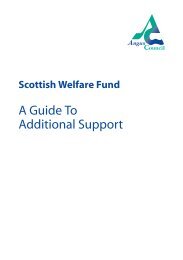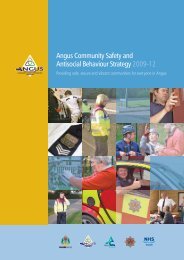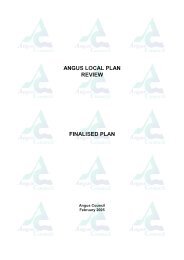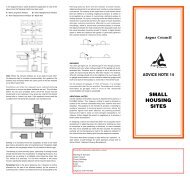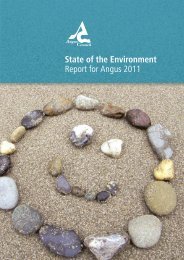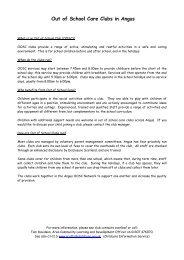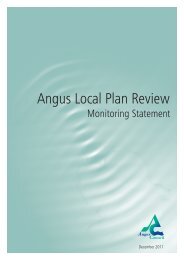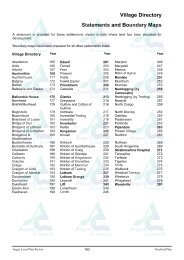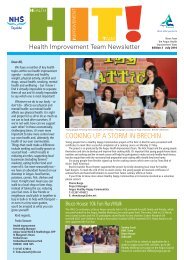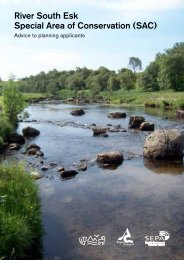Winter 2011 (1.9 MB PDF) - Angus Council
Winter 2011 (1.9 MB PDF) - Angus Council
Winter 2011 (1.9 MB PDF) - Angus Council
Create successful ePaper yourself
Turn your PDF publications into a flip-book with our unique Google optimized e-Paper software.
Housing news<br />
Things are easier with direct debit<br />
Where does condensation occur?<br />
• in unheated rooms, especially at corners where two<br />
external walls meet;<br />
• on north facing walls;<br />
• on cold surfaces such as single glazed or metal framed<br />
windows;<br />
• in kitchens and bathrooms where lots of moisture is<br />
produced;<br />
• in poorly ventilated spaces such as behind furniture<br />
placed against walls or inside wardrobes and cupboards.<br />
How can I reduce condensation?<br />
• heat your home: keep all rooms warm (above 15 degrees)especially<br />
during cold weather;<br />
• ventilate: if you have window vents, keep them open;<br />
• use extractor fans: our extractor fans are generally the<br />
type which run continuously at very low power, helping<br />
remove moist air. If you have this type of fan, make<br />
sure it is left running in low power mode;<br />
• ventilate rooms daily;<br />
• air cupboards and wardrobes.<br />
To reduce moisture in the air<br />
• cover pans when cooking, turn the extractor fan on and<br />
close the kitchen door to prevent moisture spreading;<br />
• dry clothes outside but if this isn’t possible hang your<br />
washing in a room with windows open and doors shut;<br />
• vent tumble driers to outside your home or use a selfcondensing<br />
dryer kit;<br />
• keep the bathroom door closed and use an extractor<br />
fan when bathing or showering. Running a little cold<br />
water into the bath before adding hot water helps<br />
reduce steam.<br />
• No stress: once you have signed up, that’s it! You need<br />
do nothing else ever! We’ll amend your instalments<br />
automatically each year or when the amount you<br />
need to pay changes. We’ll give you at least 3 working<br />
days’ notice before we request any amended amounts<br />
from your bank or building society account.<br />
• Flexibility: pay weekly or monthly. Monthly payments<br />
can be made on the 1st or 15th and weekly payments<br />
are taken on a Friday.<br />
• Protection: if there’s a problem, you’re protected so you<br />
have the reassurance of knowing that whatever happens<br />
your money is protected.<br />
• What to do: if you want to pay by direct debit, complete<br />
a Direct Debit form, available from your ACCESS offices<br />
or download a copy from our web site and we’ll<br />
do the rest.<br />
The risk of burst pipes increases during winter<br />
Check these things today<br />
• report any dripping taps or running overflows to us for<br />
repair<br />
• to protect your contents, make sure your home contents<br />
insurance is up to date<br />
• know where your stop cock is and how to use it<br />
The risk is greater if:<br />
• your home is unoccupied and unheated: if you’re going<br />
away over the winter months, let us know. We’ll arrange<br />
to drain down your water system for free. Keep<br />
your home as warm as you can. If you are over 60, claim<br />
your winter fuel payment: call 08459 151515 for more<br />
information.<br />
• you have water pipes in your roof space or your bathroom<br />
and kitchen face north or east<br />
In the unlikely event that a pipe bursts:<br />
• switch off your electricity supply<br />
• shut off the water supply using the stop cock<br />
• turn on all every tap to drain the water system<br />
• warn your neighbours what’s happened<br />
• contact the ACCESSline on 08452 777 778 so repairs can<br />
be ordered<br />
11




